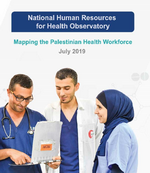Call for action to strengthen nursing workforce in the Eastern Mediterranean Region
15 January 2020 - Nurses and midwives make up more than half of the health workforce. Evidence suggests that adequate numbers of well-educated nurses are particularly well suited to tackling the rise in communicable and noncommunicable diseases, and that they significantly contribute to reducing morbidity and mortality rates and to reducing adverse health events.
Progress in strengthening nursing workforce in the Region has been slow despite the continued global and regional efforts to address the challenges facing nursing and midwifery. In the past 10 years, the density of nurses and midwives has not changed in almost all countries, it decreased in 11 countries; and the ratio of nurses and midwives to doctors has decreased in nine countries in the same period. This trend is likely to continue if the current level of production capacities is maintained. Most countries of the region are struggling with underutilization of nurses, insufficient investment in recruiting, training and retention of nurses, the poor working conditions, and increased migration and brain drain.
Building on the current attention and emphasis on the importance of the health workforce as a key component of the health system to accelerate achieving universal health coverage, a call for action was adopted by the 66th session of the Regional Committee October 2019. The call for action urges Member States to:
- Develop and implement national strategies and action plans to strengthen the nursing and midwifery workforce.
- Enhance work environments to allow nurses to use their knowledge and skills productively through well-defined standards of nursing practice, appropriate remuneration, opportunities for career development and continuing professional development.
- Ensure routine health information systems collect data on the nursing and midwifery workforce, for strategic planning, policy development and management.
- Undertake labour market analysis, and develop strategies to attract and retain the workforce, including elevating the status and value afforded to nursing and midwifery professions.
- Strengthen the primary health care nursing workforce by defining and expanding nurses’ roles and scopes of practice to maximize the utilization of their capacities.
- Reorient nursing and midwifery education and training, emphasizing primary care competencies, and develop accreditation systems to ensure the quality of education at all levels.
- Develop specific country-level activities to mark 2020 as the Year of the Nurse and Midwife.
Related links
Technical discussion paper: EM/RC66/4
Strengthening the nursing workforce to advance universal health coverage in the Eastern Mediterranean Region
English | Arabic | French
Resolution: EM/RC66/R.3
Strengthening the nursing workforce to advance universal health coverage in the Eastern Mediterranean Region
English | Arabic | French
Palestine Human Resources for Health Observatory
 19 August 2019 – The Palestine Human Resources for Health Observatory was launched on 10 July 2019, in an effort to develop a comprehensive understanding of the health workforce in Palestine. The Observatory will function as a hub for data collection and analysis, enable the dissemination of national indicators on human resources for health, and serve as a coordination platform for health providers and policy-makers.
19 August 2019 – The Palestine Human Resources for Health Observatory was launched on 10 July 2019, in an effort to develop a comprehensive understanding of the health workforce in Palestine. The Observatory will function as a hub for data collection and analysis, enable the dissemination of national indicators on human resources for health, and serve as a coordination platform for health providers and policy-makers.
The Palestine National Institute of Public Health established the national Human Resources for Health Observatory, in collaboration with the Palestinian Ministry of Health, WHO, World Bank and Palestinian and Norwegian governments. The Observatory undertook the first-ever nationwide survey of all health facilities and their health workers in the West Bank (including East Jerusalem), and Gaza Strip. For the first time, data from over 36 000 health workers practising throughout the country from governmental, private and nongovernmental organization health facilities has been compiled based on the national identification number of the health worker, helping to overcome data fragmentation and improve data quality.
An initial report "Mapping the Palestinian Health Workforce" was produced to present information derived from the Human Resources for Health Observatory that provides an in-depth analysis of the local health workforce, as well as gaps and recommendations to be addressed in order to provide policy-makers with evidence for decision-making.
Sustainable methods of connecting with stakeholders and partners to gather and report on national indicators ensures this information will be updated on an annual basis, allowing for proper monitoring of human resources for health, conducting advocacy for health workforce issues and coordinating and promoting research. This information will also provide policy-makers with evidence to develop the first national human resources for health strategy. Ultimately these efforts will help improve the quality and access to health care for all Palestinians.
Related links
Human Resources for Health Observatory
Mapping the Palestinian Health Workforce [report]


